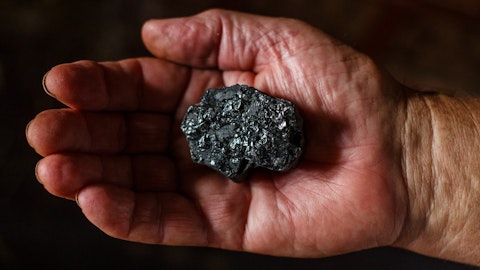J.C. Butler: Well, I think ultimately, the customer is, TVA, right, which essentially is a government entity. So I think when you look at TVA interest in this plant from a resiliency and reliability standpoint and the way they’ve described the plant publicly, I think it’s pretty safe to say that they intend to operate — intend to take electricity from this plant for the foreseeable future. So if you work your way back through the value chain, I think that’s how we feel pretty comfortable with the way this is all put together. We do acknowledge, however, that Southern Company and the bondholders are trying to work out some situations between them, but that’s really between them. But ultimately, TVA is really the end customer here.
Nachy Kanfer: Got it. That’s helpful. So from NACCO’s perspective, a default at generation, there’s no material risk to coal sales or coal revenue — coal sales revenue at that customer?
J.C. Butler: Well, I think it’s — I mean, I’ll go back to TVA, right? Everybody’s got a chain of contracts that work themselves from us supplying coal all the way through TVA taking energy. And I think the only way anybody gets any recovery on their own investment is by operating the plant. And you can’t operate the plant without coal coming out of our mind. So in everybody’s best interest to continue to operate.
Nachy Kanfer: Got it. And then at Rainbow, I wanted to ask about EPA-proposed action on Coal Creek’s Part B application under the coal residuals — Coal Combustion Residuals . My understanding is EPA is proposing to deny Coal Creek’s Part B application, which would result in a significant capital expense to upgrade ash handling and other things. Don’t have a handle on what that capital expense is. I’m wondering if you do — and if you can give me a sense of kind of — what does that contract work in terms of EPS or anything else? How are we thinking about that?
J.C. Butler: Good question. I’m going to give you, unfortunately, 2 answers that aren’t going to be very helpful to you. But one is that Coal Creek’s negotiations or discussions with the EPA between them. I don’t think it’s right for me to comment on those. And we have never disclosed our individual profits that we make at any of these mines for obvious competitive reasons.
Nachy Kanfer: Understood. I guess can you describe — so is there a risk that Coal Creek declares force majeure on your like brand new renegotiated contract there? And how are you thinking about that risk? Well, maybe not force majeure. I mean, I’m not an attorney, but…
J.C. Butler: Yes, well, that’s what threw me. I’m like, well, how this force majeure coming to this.
Nachy Kanfer: Is there a risk that there’s a termination, an early termination of some sort to that coal sales agreement?
J.C. Butler: Not that we see. I mean, look, is there a remote possibility that anything can happen. I mean, it could get hit by an asteroid, right? So things can happen, but we don’t view that as a significant risk.
Operator: We have no further questions. I’ll now hand you back over to Christina Kmetko for closing remarks.
Christina Kmetko: Thank you. We’ll close with just a few final reminders. A replay of our call will be available online later this morning. We’ll also post a transcript on the Investor Relations website when it becomes available. If you have any questions, please reach out to me. You can reach me at the phone number on the press release. I hope you enjoy the rest of your day, and now back to our operator to conclude the call.
Operator: This concludes today’s call. Thank you for joining us. You may now disconnect your lines.
Follow Nacco Industries Inc (NYSE:NC)
Follow Nacco Industries Inc (NYSE:NC)
Receive real-time insider trading and news alerts




